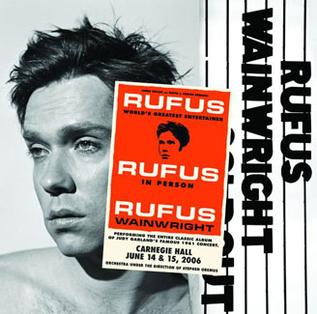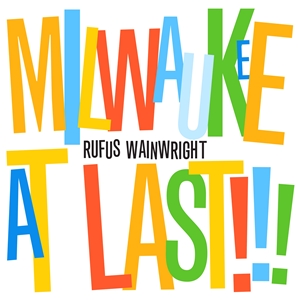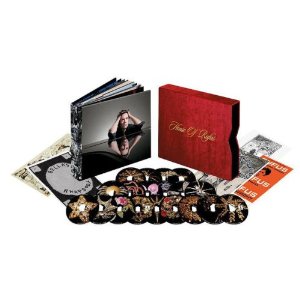
Rufus McGarrigle Wainwright is a Canadian-American singer, songwriter, and composer. He has recorded 10 studio albums and numerous tracks on compilations and film soundtracks. He has also written two classical operas and set Shakespeare's sonnets to music for a theatre piece by Robert Wilson.

Want One is the third studio album by the Canadian-American singer-songwriter Rufus Wainwright, released through DreamWorks Records on September 23, 2003. The album was produced by Marius de Vries and mixed by Andy Bradfield, with Lenny Waronker as the executive in charge of production. Want One spawned two singles: "I Don't Know What It Is", which peaked at number 74 on the UK Singles Chart, and "Oh What a World". The album charted in three countries, reaching number 60 on the Billboard 200, number 130 in France, and number 77 in the Netherlands.

Loudon Snowden Wainwright III is an American singer-songwriter and occasional actor. He has released twenty-six studio albums, four live albums, and six compilations. Some of his best-known songs include "The Swimming Song", "Motel Blues", "The Man Who Couldn't Cry", "Dead Skunk", and "Lullaby". In 2007, he collaborated with musician Joe Henry to create the soundtrack for Judd Apatow's film Knocked Up. In addition to music, he has acted in small roles in at least eighteen television programs and feature films, including three episodes in the third season of the series M*A*S*H.

Poses is the second studio album by the American-Canadian singer-songwriter Rufus Wainwright, released through DreamWorks Records in June 2001. The album was recorded, mixed, and produced by Pierre Marchand, with select tracks produced by Propellerheads' Alex Gifford ("Shadows"), Ethan Johns ("California"), Damian LeGassick, and Greg Wells.

Want Two is the fourth album by American-Canadian singer-songwriter Rufus Wainwright. The album was released on November 16, 2004. Four of the tracks on this album were released in the summer of 2004 as the EP Waiting for a Want on the iTunes music store.

Rufus Wainwright is the debut studio album by Canadian-American singer-songwriter Rufus Wainwright, released in the United States on May 19, 1998, through DreamWorks Records. The album was produced by Jon Brion, with the exception of "In My Arms", which was produced and mixed by Pierre Marchand, and "Millbrook" and "Baby", which were produced by Brion and Van Dyke Parks. Lenny Waronker was the album's executive producer.

Release the Stars is the fifth studio album by Canadian-American singer-songwriter Rufus Wainwright, released through Geffen Records on May 15, 2007. Pet Shop Boys' Neil Tennant was the executive producer; the album was mixed by Record producer Marius de Vries and Andy Bradfield. Wainwright's most commercially successful album to date, Release the Stars charted in 13 countries, reaching Top 10 positions in Denmark, Norway, and the United Kingdom, and was certified gold in Canada and the UK. The album generated three singles: "Going to a Town", which peaked at number 54 on the UK Singles Chart, "Rules and Regulations", and "Tiergarten".

Rufus Does Judy at Carnegie Hall is the sixth album by the Canadian-American singer-songwriter Rufus Wainwright, released through Geffen Records in December 2007. The album consists of live recordings from his sold-out June 14–15, 2006, tribute concerts at Carnegie Hall to the American actress and singer Judy Garland. Backed by a 36-piece orchestra conducted by Stephen Oremus, Wainwright recreated Garland's April 23, 1961, concert, often considered "the greatest night in show business history". Garland's 1961 double album, Judy at Carnegie Hall, a comeback performance with more than 25 American pop and jazz standards, was highly successful, initially spending 95 weeks on the Billboard charts and garnering five Grammy Awards.

The discography of Rufus Wainwright, a Canadian-American singer-songwriter, consists of ten studio albums, six live albums, three compilations, three extended plays (EPs), three video albums, nine singles, and nine music videos. Wainwright's self-titled debut album was released through DreamWorks Records in May 1998. Wainwright reached number 24 on Billboard's Top Heatseekers chart, and Rolling Stone named him 1998's Best New Artist. Wainwright's second album, Poses, was released through the same label in June 2001, resulting in a number one on the Heatseekers Chart and number 117 on the Billboard 200. With material recorded from the same session, Want One was released through DreamWorks in September 2003, and Want Two was released through Geffen Records in November 2004.

Milwaukee at Last!!! is the seventh album by Canadian-American singer-songwriter Rufus Wainwright, released in the United States on September 22, 2009. The album consists of live recordings from his August 27, 2007, performance at the Pabst Theater in Milwaukee, Wisconsin in support of his previous studio album, Release the Stars (2007). Documentary film director Albert Maysles recorded a film of the same name for DVD, also released on September 22 in the US.

All Days Are Nights: Songs for Lulu is the sixth studio album by Canadian-American singer-songwriter Rufus Wainwright, first released in Canada through Decca Records on March 23, 2010. The album was produced by Wainwright, and mixed by Marchand, who produced Wainwright's second album, Poses (2001).

House of Rufus is a collection of six studio albums, two live albums, four additional albums of previously unreleased material, and six DVDs recorded by Canadian-American singer-songwriter Rufus Wainwright, reissued as a 19-disc box set in the United Kingdom on July 18, 2011. Wainwright's official site claimed that the collection "spans Rufus' entire career and represents the most complete collection of Rufus Wainwright recordings to date."

Out of the Game is the seventh studio album by singer-songwriter Rufus Wainwright, released in Australia, the United Kingdom and Canada in April 2012 and in the United States on May 1, 2012 through Decca Records/Polydor Records. The album was produced by Mark Ronson. Recording sessions began in May 2011. Guest musicians include his sister Martha Wainwright, Thomas "Doveman" Bartlett, drummer Andy Burrows, guitarist Nels Cline, members of the Dap-Kings, Sean Lennon, the alternative rock band Wilco, Miike Snow's Andrew Wyatt and Yeah Yeah Yeahs guitarist Nick Zinner.

Vibrate: The Best of Rufus Wainwright, sometimes referred to simply as Vibrate: The Best Of, is the greatest hits album by American-Canadian singer-songwriter Rufus Wainwright, released on February 28, 2014 in Australia and Ireland by Universal Music Enterprises and in other nations subsequently. The standard issue of the album includes eighteen songs from six of Wainwright's studio releases, including his self-titled debut album (1998), Poses (2001), Want One (2003), Want Two (2004), Release the Stars (2007) and Out of the Game (2012), plus soundtrack contributions and one previously unreleased track. The deluxe version includes a bonus disc with sixteen rare and unreleased recordings, both live and studio recorded. Featured are "Chic and Pointless", previously unreleased and produced by Guy Chambers, and "WWIII", a song that was co-written by Chambers and had not been released in a physical form until Vibrate.

Rufus Wainwright: Live from the Artists Den is a live album by American-Canadian singer-songwriter Rufus Wainwright, released by Artists Den Records and Universal Music Enterprises on March 3, 2014. The album was recorded at a concert on May 17, 2012 at the Church of the Ascension in Greenwich Village, New York City, which was originally filmed for the PBS program Live from the Artists Den.

"Me and Liza" is a song by American-Canadian singer-songwriter Rufus Wainwright for his greatest hits album, Vibrate: The Best of Rufus Wainwright (2014); it appears as the third track on the album's standard issue, serving as its lead single. The song is about Wainwright's relationship with Liza Minnelli, who was reportedly upset by his 2006 tribute concerts to her mother, Judy Garland. It premiered on BBC Radio 2's Weekend Wogan on January 12, 2014 and was officially released on January 20. "Me and Liza" reached a peak position of number 59 on Belgium's Ultratop singles chart.
"Gay Messiah" is a song written and performed by American-Canadian singer-songwriter Rufus Wainwright. It originally appeared on his EP, Waiting for a Want, released by DreamWorks Records in June 2004 as a preview of his fourth studio album, Want Two, released by Geffen Records in November 2004.

"April Fools" is a song written and performed by American-Canadian singer-songwriter Rufus Wainwright. It originally appeared on his eponymous debut studio album, released by DreamWorks Records in May 1998. The song's music video was directed by Sophie Muller and features cameo appearances by Gwen Stefani and Melissa Auf der Maur.
"The Art Teacher" is a song written and performed by American-Canadian singer-songwriter Rufus Wainwright. It originally appeared on his extended play (EP), Waiting for a Want, released by DreamWorks Records in June 2004 as a preview of his fourth studio album, Want Two, which was released by Geffen Records in November 2004. The lyrics in the piano ballad describe a middle-aged woman's recollection of an unrequited love for her teacher. The song explores gender and sexuality, and its music has been compared to work by Philip Glass.
"One Man Guy" is a song written by American singer-songwriter Loudon Wainwright III. It originally appeared on his 1985 studio album I'm Alright, and was included on his 2009 compilation album Essential Recordings: One Man Guy.

















